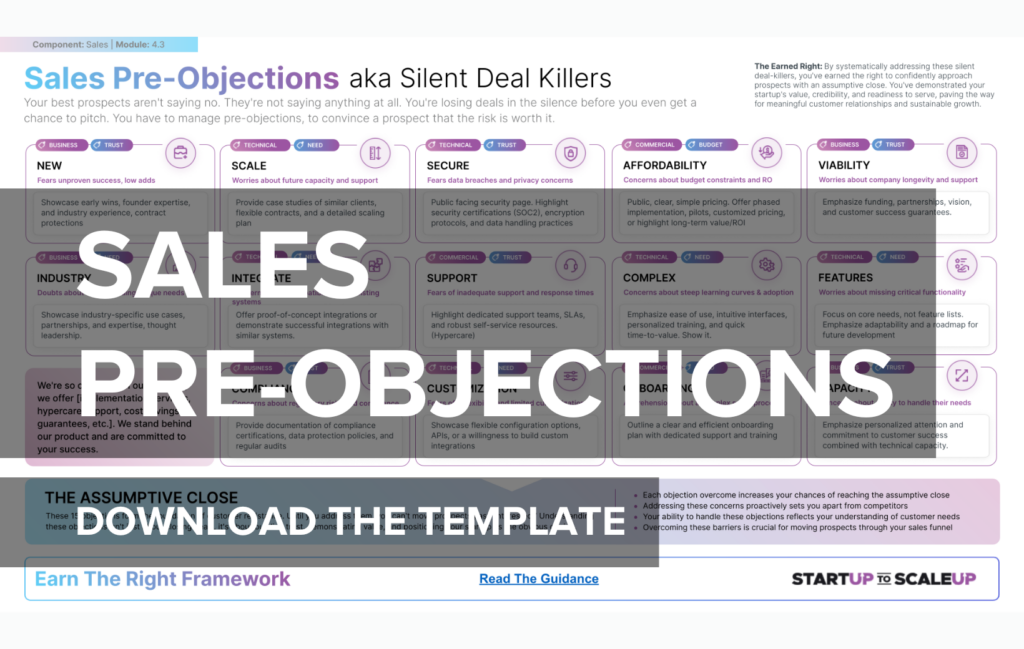How Can Startup Founders Overcome Pre-Sale Objections?
Why are pre-sale objections particularly challenging for startups?
Pre-sale objections are especially challenging for startups because:
- Limited track record: New companies lack a proven history of success.
- Resource constraints: Startups often can’t match the offerings of established competitors.
- Market skepticism: Potential customers may be wary of unproven solutions.
- Brand recognition: Lack of brand awareness can lead to trust issues.
- Product maturity: Early-stage products may not have all desired features.
These factors can create significant barriers to closing deals, making it crucial for startups to proactively address common objections.
What are the most common pre-sale objections startups face?
Startups typically encounter several common pre-sale objections:
- Stability concerns: Worries about the startup’s longevity and support.
- Limited features: Product may lack some capabilities compared to competitors.
- Integration issues: Concerns about compatibility with existing systems.
- Price objections: Perceived high cost or unclear ROI.
- Lack of social proof: Limited customer testimonials or case studies.
- Risk aversion: Fear of adopting an unproven solution.
Understanding these objections is the first step in developing strategies to overcome them.
How can startup founders build credibility to overcome trust-related objections?
Building credibility is crucial for overcoming trust-related objections:
- Showcase expertise: Demonstrate deep industry knowledge through content marketing.
- Highlight team credentials: Emphasize team members’ relevant experience and achievements.
- Secure partnerships: Align with reputable companies or institutions in your industry.
- Obtain certifications: Pursue relevant industry certifications or compliance standards.
- Be transparent: Openly discuss your startup’s journey, challenges, and vision.
Remember, building credibility is an ongoing process that requires consistent effort across all customer touchpoints.
What strategies can help startups address price objections?
To address price objections, startups can:
- Focus on value: Clearly articulate the ROI and unique benefits of your solution.
- Offer flexible pricing: Consider tiered pricing or customizable packages.
- Provide comparison tools: Help prospects understand your pricing relative to alternatives.
- Use risk reversal: Offer money-back guarantees or free trials to lower perceived risk.
- Highlight hidden costs: Explain how your solution may reduce other expenses.
The key is to shift the conversation from price to value, demonstrating why your solution is worth the investment.
How can startups leverage social proof to overcome objections?
Social proof can be a powerful tool for overcoming objections:
- Customer testimonials: Share detailed success stories from satisfied clients.
- Case studies: Develop in-depth analyses of how your solution solved real problems.
- User reviews: Encourage and showcase authentic user feedback.
- Industry recognition: Highlight any awards, rankings, or positive press coverage.
- Partnership logos: Display logos of reputable clients or partners on your website.
Even with limited customers, focus on quality over quantity. A few strong, detailed testimonials can be very impactful.
How should startup founders address concerns about product reliability?
To address reliability concerns:
- Offer robust support: Provide clear, accessible customer support channels.
- Share uptime statistics: If applicable, be transparent about your product’s reliability.
- Explain redundancy: Describe your backup and disaster recovery processes.
- Provide SLAs: Offer service level agreements to guarantee performance.
- Continuous improvement: Communicate your commitment to ongoing product development.
Be honest about where your product stands, but emphasize your commitment to reliability and continuous improvement.
What role does the sales process play in overcoming pre-sale objections?
The sales process is crucial in addressing pre-sale objections:
- Early identification: Proactively uncover potential objections early in the process.
- Tailored approach: Customize your pitch to address each prospect’s specific concerns.
- Education focus: Use the sales process to educate prospects about your solution and industry.
- Relationship building: Establish trust through consistent, value-added interactions.
- Proof of concept: Offer limited trials or pilot programs to demonstrate value.
Train your sales team to view objections as opportunities to provide clarity and demonstrate value, rather than obstacles to overcome.
Overcoming pre-sale objections is a critical skill for startup founders. It requires a combination of preparation, transparency, and a deep understanding of your customers’ needs and concerns. Focus on building credibility, demonstrating clear value, and addressing concerns proactively. Remember, every objection is an opportunity to strengthen your relationship with potential customers and refine your offering.
By consistently addressing and overcoming objections, you’ll not only close more deals but also build a stronger, more resilient startup in the long run.
